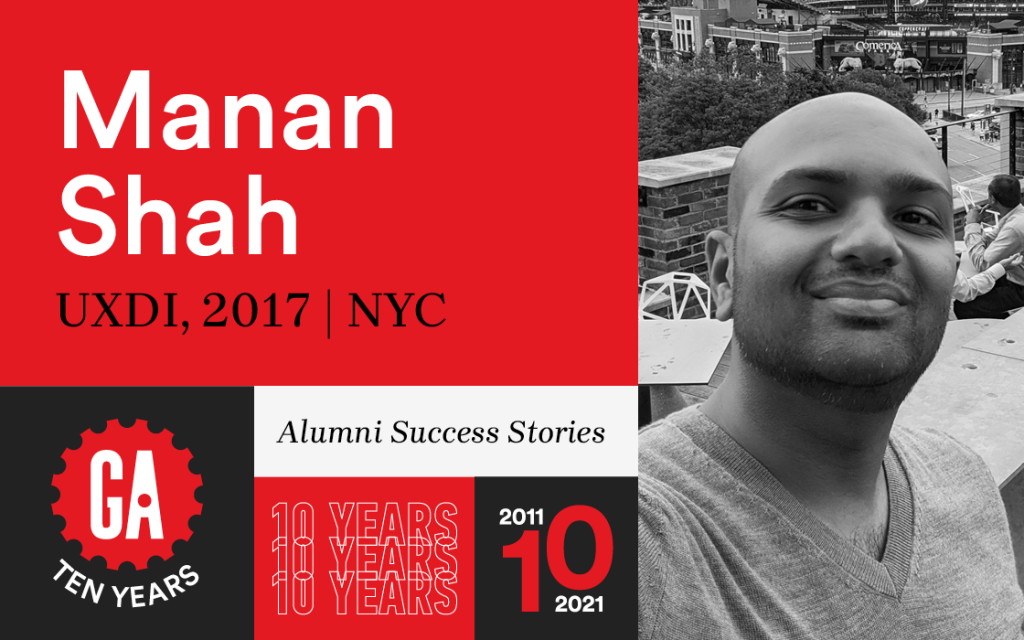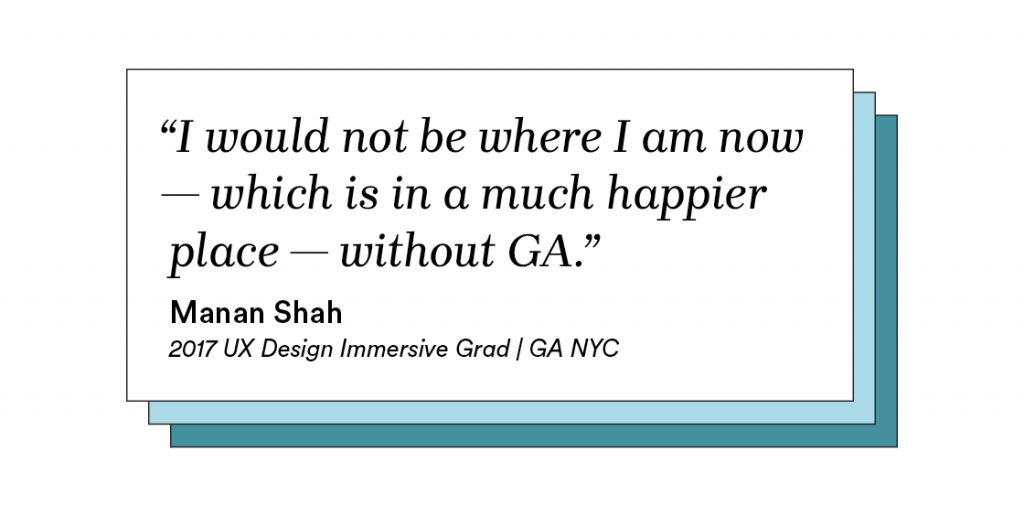
It’s never too late to pursue work you love — that’s what we learned catching up with User Experience Immersive Design (UXDI) alum, Manan Shah, about his journey from senior finance professional to user experience (UX) designer. Working in a high-paying, secure role for over a decade, you might think, “What more could you ask for in a career?” But it wasn’t until after Manan secured a role at JPMorgan Chase & Co. as a senior UX designer that he learned what was missing: work he loved. Learn how he navigated his career change and what he discovered along the way.
I was brought up in a single-parent immigrant household where education and extracurricular activities were important to my mom as long as they pushed me forward. This honed my creativity, as I had to make more with less.
I graduated from the University of Maryland with a degree in finance and went to work at Lehman Brothers after getting a full-time offer from my internship. I worked there for two years before they went bankrupt, but luckily the division I worked for, Neuberger Berman, was able to spin itself off into a private company.
What were you doing before you came to GA? What was difficult or dissatisfying about it that prompted you to make a change?
At Neuberger Berman, I was most recently a VP in Internal Audit, but there were a few reasons why I decided it was the right time to look for a new challenge. I had worked at the same place for 11 years after graduating college and never even interviewed for a full-time job. I learned how to excel in a structured environment, but I didn’t have the opportunity to flex my creative skills. I also wanted to start a family soon and knew it was my last chance to take a risk and do something different.
What about UX specifically intrigued you to explore it as a career? What was the defining moment that pushed you forward?
Thankfully, my wife encouraged me to look outside of finance. I realized that I wanted to do something future-leaning (i.e. tech) that also repurposed my existing skill set, so I would not have to start from the bottom. I went down a rabbit hole of different career websites and spoke to countless people until I connected with a few design professionals. When I learned about UX, I thought it would be a great fit for my skill set and would incorporate both the left and right sides of my brain.
GA has a great reputation among bootcamps, especially since they have a large employer network. It was also suggested to me by a few people, so I went to an open house. Coincidentally, the instructor was a UX designer at an accounting company. He said things that kept checking boxes for me:
- Am I the kind of person who asks how things could be made better?
- Do I want a seat at the table to advocate for the person actually using the product?
- Do I like to find new ways to do things, like “hacks”?
When I asked him his opinion on a career change from finance to UX, he intimately understood my skills as an auditor and connected the dots from that role to UX. At that moment, I knew what I wanted as my next challenge.
What was the best thing about UXDI for you and the GA experience overall?
The support and encouragement from my instructors and fellow classmates were key to my success. I was able to help others with concepts I knew, and they helped teach me things I was not as confident in.
The icing on the cake was the final project with a real client. It taught me so much about UX and myself, including what expectations can and cannot be met. It was also one of the main topics I discussed in my first set of interviews.
Can you share more about your capstone project?
I went into the project with really high expectations, but I was not prepared for the amount of work the client’s product required to achieve its goals and reflect my new skill set. I was disheartened to say the least. I shared my feelings with my team, and they felt similarly. But our instructors pointed out that our project was the best one to highlight the impact we can make with UX. As we finished presenting to the client, we braced for negative feedback. Much to our surprise, the client was overjoyed with our design, and I left feeling so much pride in what I had accomplished. This was a clear example of not judging a book by its cover.
How has GA been a resource to you in terms of finding a job after completing your program?
My career coach, Anna, was amazing!!! She made us stick to a plan and carry it out — even when we were insanely busy. Through every up and down, she was a great resource when you needed something, as long as you showed you were committed.
How do you think your background in finance prepared you for your career in UX?
My finance career honed a lot of the soft and hard skills I use today as a designer, such as running my own projects, time management, prioritization, creating reports and presentations, interviewing auditees, learning from missteps, speaking up or taking a back seat when needed, analyzing qualitative and quantitative data, and problem solving.
What do you love most about your current role?
I was thrilled to get the senior UX designer role at JPMorgan Chase & Co., since it married my previous job as an auditor at an asset management company to my new career. But the things I love the most are:
- I have met so many interesting, open-minded people who bring fresh ideas and experiences to the table.
- I am able to own the product from a design perspective. My manager pushes me but also allows me to shine and take in wins.
- The product I work on helps users to see their finances in one holistic view. I am helping the greater good, and I feel good at the end of the day because of it.

How did the skills you learned at GA help you in your current career?
I would not be where I am now — which is in a much happier place — without GA. One of the biggest skills my instructors taught me was navigating ambiguity. When I was in finance working as an auditor, I requested everything I needed to accomplish my work. With UX there is no final answer; the discipline as a whole requires some comfort with gray area and making decisions without having all the answers.
As you know, creativity and logic are not mutually exclusive. How have you witnessed those left-brain and right-brain skills complement each other in your current role?
As a UX designer, the visual skill set is obviously important, but it is easy to underestimate how much impact an analytical skill set can have on your work. I’ve been brought onto many projects simply to nail down the root cause of a problem we should solve. A seamless and easy consumer experience, at the end of the day, is a logical one. From a collaboration standpoint, I have product and tech partners who appreciate how I can think beyond the design and see the big picture.
Do you find that combo to be an uncommon hybrid skill set that gives you a competitive edge? Or is it something typical in your field?
This is a skill that great designers have. It’s also one that designers can learn, but some pick it up quicker than others. Those that do are able to move onto more complex designs and deliver a cohesive product. I believe that having both enabled me not to have to start my new career from scratch.
Sometimes, we can unintentionally lock ourselves into a label: “I am a creative” or “I am a technician.” What would you say to someone who is interested in UX but doesn’t consider themself to be either creative or technical enough?
UX is one of those careers where there is something for everyone. As long as your goal is to produce the best product for the customer, you can find your niche based on your strengths. You can be a designer, researcher, content editor, architect, or any mix of those areas. While being technical or creative will most definitely help, there are so many skills that you can bring to the table that will help you in your journey. Soft skills can elevate you. There are designers who may not be the best at presenting — and if you can’t sell your design, then it doesn’t matter how creative it is. Or, if you can’t convey to the developer what you are designing, it won’t be created as intended.
In respect to UX, what do you want your legacy to be? Is there a change you want to inspire or a mission that defines the work that’s important to you?
In my prior work, I was able to help my company do things better, but I wanted my work to be more personally fulfilling. In my new career, I wanted to do better for the public and have a direct impact. I want a legacy where I see other competitors using elements of my work because the competition views it as the best experience for their users — which I have already begun to see.